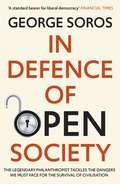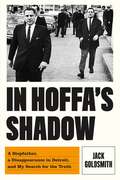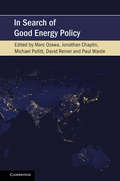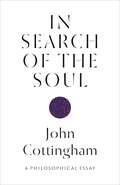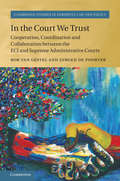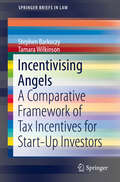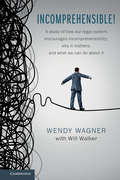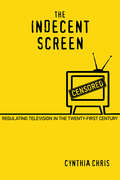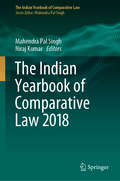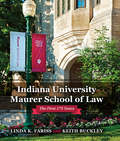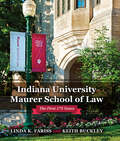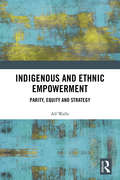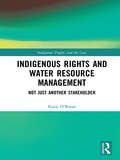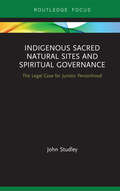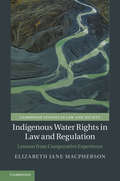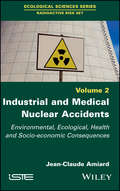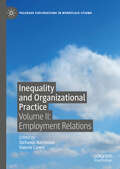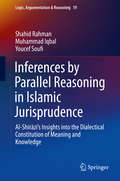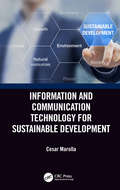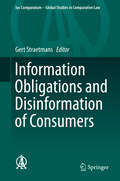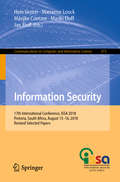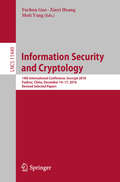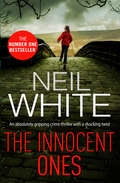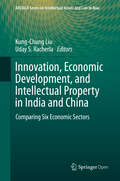- Table View
- List View
In Defence of Open Society: The Legendary Philanthropist Tackles the Dangers We Must Face for the Survival of Civilisation
by George SorosGeorge Soros is among the world's most prominent public figures. He is one of the history's most successful investors and his philanthropy, led by the Open Society Foundations, has donated over $14 billion to promote democracy and human rights in more than 120 countries. But in recent years, Soros has become the focus of sustained right-wing attacks in the United States and around the world based on his commitment to open society, progressive politics and his Jewish background. In this brilliant and spirited book, Soros offers a compendium of his philosophy, a clarion call-to-arms for the ideals of an open society: freedom, democracy, rule of law, human rights, social justice, and social responsibility as a universal idea. In this age of nationalism, populism, anti-Semitism, and the spread of authoritarian governments, Soros's mission to support open societies is as urgent as it is important.
In Hoffa's Shadow: A Stepfather, A Disappearance in Detroit, and My Search for the Truth
by Jack GoldsmithOn July 30, 1975, Jimmy Hoffa, the renowned former leader of the Teamsters union, disappeared in broad daylight from the parking lot of the Machus Red Fox restaurant, in a Detroit suburb. Hoffa was one of the most famous people in America. His disappearance was a national sensation and proved to be one of the best-executed unsolved crimes in American history. Now, in this groundbreaking book, the distinguished legal thinker Jack Goldsmith illuminates Hoffa's disappearance and influence from a vital--and unexpected--new perspective. As a boy, Goldsmith adored his stepfather, Chuckie O'Brien, who was known to the world as Jimmy Hoffa's right-hand man of many years. Following Hoffa's disappearance, the FBI publicly accused O'Brien of picking up Hoffa at the Machus Red Fox and driving him to his death on behalf of the mob. As Goldsmith grew older and pursued a career in law and government, he began to doubt, and to distance himself from, the man he once revered. It was only years later, when Goldsmith was serving as an assistant attorney general in the George W. Bush administration and investigating the government's misuse of surveillance powers, that he began to reconsider O'Brien and his legacy. In Hoffa's Shadow tells the moving story of how Goldsmith reunited with the stepfather he once disowned and then set out to unravel one of the twentieth century's most persistent mysteries and to clear O'Brien's name. Goldsmith presents evidence that his stepfather did not betray Hoffa and relates his discussions with FBI agents who worked the case over the decades. He casts new light on the architects of Hoffa's disappearance, on the century-old surveillance state, and on how government investigators can ruin innocent lives through mistakes, neglect, and abuse. Goldsmith also explores the rise and fall of Hoffa, the mob, and labor unions, and--above all--probes the heartrending complexities of love and loyalty.
In Search of Good Energy Policy (Cambridge Studies on Environment, Energy and Natural Resources Governance)
by Marc Ozawa Jonathan Chaplin Michael Pollitt David Reiner Paul WardeDrawing on political science, economics, philosophy, theology, social anthropology, history, management studies, law, and other subject areas, In Search of Good Energy Policy brings together leading academics from across the social sciences and humanities to offer an innovative look at why science and technology, and the type of quantification they champion, cannot alone meet the needs of energy policy making in the future. Featuring world-class researchers from the University of Cambridge and other leading universities around the world, this innovative book presents an interdisciplinary dialogue in which scientists and practitioners reach across institutional divides to offer their perspectives on the relevance of multi-disciplinary research for 'real world' application. This work should be read by anyone interested in understanding how multidisciplinary research and collaboration is essential to crafting good energy policy.
In Search of the Soul: A Philosophical Essay
by John CottinghamHow our beliefs about the soul have developed through the ages, and why an understanding of it still matters todayThe concept of the soul has been a recurring area of exploration since ancient times. What do we mean when we talk about finding our soul, how do we know we have one, and does it hold any relevance in today’s scientifically and technologically dominated society? From Socrates and Augustine to Darwin and Freud, In Search of the Soul takes readers on a concise, accessible journey into the origins of the soul in Western philosophy and culture, and examines how the idea has developed throughout history to the present. Touching on literature, music, art, and theology, John Cottingham illustrates how, far from being redundant in contemporary times, the soul attunes us to the importance of meaning and value, and experience and growth. A better understanding of the soul might help all of us better understand what it is to be human.Cottingham delves into the evolution of our thoughts about the soul through landmark works—including those of Aristotle, Plato, and Descartes. He considers the nature of consciousness and subjective experience, and discusses the psychoanalytic view that large parts of the human psyche are hidden from direct conscious awareness. He also reflects on the mysterious and universal longing for transcendence that is an indelible part of our human makeup. Looking at the soul’s many dimensions—historical, moral, psychological, and spiritual—Cottingham makes a case for how it exerts a powerful pull on all of us.In Search of the Soul is a testimony to how the soul remains a profoundly significant aspect of human flourishing.
In the Court We Trust: Cooperation, Coordination and Collaboration between the ECJ and Supreme Administrative Courts (Cambridge Studies in European Law and Policy)
by Rob van Gestel Jurgen de PoorterThe preliminary reference procedure has long been envisaged as a judicial dialogue between the European Court of Justice and national courts. However, in reality the relationship appears to be closer to one of growing separation rather than to a happy marriage between equal partners. This book tries to find out: what is behind this? A study of the existing literature, combined with a case law analysis and interviews with judges, has shown that there are a number of important stumble blocks hindering the communication between these courts, such as language barriers, time constraints, and a failing digital infrastructure. However, on a deeper level there also appears to be a lack of mutual trust that prevents Supreme Administrative Courts from using the possibilities the procedure provides, such as the opportunity to offer provisional answers to the Court of Justice and the use of requests for clarification by the latter.
Incentivising Angels: A Comparative Framework of Tax Incentives for Start-Up Investors (SpringerBriefs in Law)
by Stephen Barkoczy Tamara WilkinsonThis book examines tax incentives for investors in start-up companies through a critical analysis of Australia’s early-stage investors (ESI) program, and a comparison of that program with the United Kingdom’s Seed Enterprise Investment Scheme (SEIS) upon which it is loosely modelled. It discusses the importance of innovation and the special role that venture capital plays in supporting start-ups, and explains the policy rationale for introducing the ESI program as well as dissecting its technical requirements in detail. Special attention is devoted to the program’s ‘early stage’ and ‘innovation’ requirements, which are crucial for determining whether a start-up qualifies for the tax incentives. The book is the first in-depth scholarly legal analysis of the ESI program and the first occasion it has been compared and contrasted with a foreign program. The comparative discussion of the ESI program with the SEIS program enables the authors to make suggestions for reforms to the ESI program so that it can better achieve its policy objectives. The fact that the book includes reform suggestions makes it particularly interesting for policy makers. It is also of broad relevance to legal and finance scholars and students as well as entrepreneurs, angels, venture capitalists and their advisors.
Incomprehensible!: A Study of How our Legal System Encourages Incomprehensibility, Why It Matters, and What We Can Do About It
by Wendy WagnerThe legal system is awash with excessive and incomprehensible information. Yet many of us assume that the unrelenting torrent of information pouring into various legal programs is both inevitable and unstoppable. We have become complacent; but it does not have to be this way. Incomprehensible! argues that surrendering to incomprehensibility is a bad mistake. Drawing together evidence from diverse fields such as consumer protection, financial regulation, patents, chemical control, and administrative and legislative processes, this book identifies a number of important legal programs that are built on the foundational assumption that 'more information is better'. Each of these legal processes have been designed in ways that ignore the imperative of meaningful communication. To rectify this systemic problem, the law must be re-designed to pay careful attention to the problem of incomprehensibility.
The Indecent Screen: Regulating Television in the Twenty-First Century
by Cynthia ChrisThe Indecent Screen explores clashes over indecency in broadcast television among U.S.-based media advocates, television professionals, the Federal Communications Commission, and TV audiences. Cynthia Chris focuses on the decency debates during an approximately twenty-year period since the Telecommunications Act of 1996, which in many ways restructured the media environment. Simultaneously, ever increasing channel capacity, new forms of distribution, and time-shifting (in the form of streaming and on-demand viewing options) radically changed how, when, and what we watch. But instead of these innovations quelling concerns that TV networks were too often transmitting indecent material that was accessible to children, complaints about indecency skyrocketed soon after the turn of the century. Chris demonstrates that these clashes are significant battles over the role of family, the role of government, and the value of free speech in our lives, arguing that an uncensored media is so imperative to the public good that we can, and must, endure the occasional indecent screen.
The Indian Yearbook of Comparative Law 2018 (The Indian Yearbook of Comparative Law)
by Mahendra Pal Singh Niraj KumarThis yearbook is a compilation of thematically arranged essays that critically analyseemerging developments, issues, and perspectives across different branches of law. Itconsists of research from scholars around the world with the view that comparativestudy would initiate dialogue on law and legal cultures across jurisdictions. The themesvary from jurisprudence of comparative law and its methodologies to intrinsic detailsof specific laws like memory laws. The sites of the enquiries in different chapters aredifferent legal systems, recent judgements, and aspects of human rights in a comparativeperspective. It comprises seven parts wherein the first part focuses on general themesof comparative law, the second part discusses private law through a comparative lens,and the third, fourth and fifth parts examine aspects of public law with special focuson constitutional law, human rights and economic laws. The sixth part engages withcriminal law and the last part of the book covers recent developments in the field ofcomparative law. This book intends to trigger a discussion on issues of comparativelaw from the vantage point of Global South, not only focusing on the Global North.It examines legal systems of countries from far-east and sub-continent and presentsinsights on their working. It encourages readers to gain a nuanced understanding ofthe working of law, legal systems and legal cultures, adding to existing deliberationson the constituents of an ideal system of law.
Indiana University Maurer School of Law: The First 175 Years (Well House Books)
by Linda K. Fariss Keith BuckleyThroughout its 175-year history, the Indiana University Maurer School of Law has grown, diversified, and flourished to become of a nationally recognized law school. With strong and dedicated leadership, the school has emerged into the 21st century stronger than ever and has partnerships among with leading institutions in the world, and an alumni base that spans the globe. Preparing student for the practice of law, promoting the best interests of society, and taking a leadership role in providing solutions to the most pressing problems of society, are among the many achievements of the school and its faculty. Filled with historical photographs and engaging sidebars, this book tells the story of the individuals who built, sustained, and strengthened the Indiana University Maurer School of Law.
Indiana University Maurer School of Law: The First 175 Years (Well House Bks.)
by Linda K. Fariss Keith BuckleyA history of one of America’s oldest law schools, with photos and illustrations included.Throughout its 175-year history, the Indiana University Maurer School of Law has grown, diversified, and flourished to become of a nationally recognized law school. With strong and dedicated leadership, the school has emerged into the twenty-first century stronger than ever and has partnerships with leading institutions around the world, and an alumni base that spans the globe. Preparing students for the practice of law, promoting the best interests of society, and taking a leadership role in providing solutions to the most pressing problems of society are among the many achievements of the school and its faculty.Filled with historical photographs and engaging sidebars, this book tells the story of the individuals who built, sustained, and strengthened the Indiana University Maurer School of Law.
Indigenous and Ethnic Empowerment: Parity, Equity and Strategy
by Alf H. WalleIndigenous, ethnic and rural peoples throughout the world struggle to effectively deal with the challenges triggered by outside economic and social intervention. This book presents business methods in a manner that reflects the needs, desires and priorities of indigenous peoples and provides the tools communities need to envision and deal with the full impact of social and economic intervention. In particular, the book helps local leaders and their advocates to better understand the full implications of the choices before them and develop skills to articulate and deal with local goals, needs, and priorities. The book is distinctive because it helps people embrace opportunities and change on their own terms. As a result, leaders and their advocates will be better able to evaluate and respond to opportunities in an informed and systematic manner. Various business disciplines (such as accounting, finance, human resource management, organizational theory, and marketing) are discussed in ways that help the reader to envision both mainstream perspectives and the distinctive issues faced by ethnic enclaves.
Indigenous Rights and Water Resource Management: Not Just Another Stakeholder (Indigenous Peoples and the Law)
by Katie O'BryanIn an era of climate change, the need to manage our water resources effectively for future generations has become an increasingly significant challenge. Indigenous management practices have been successfully used to manage inland water systems around the world for thousands of years, and Indigenous people have been calling for a greater role in the management of water resources. As First Peoples and as holders of important knowledge of sustainable water management practices, they regard themselves as custodians and rights holders, deserving of a meaningful role in decision-making. This book argues that a key (albeit not the only) means of ensuring appropriate participation in decision-making about water management is for such participation to be legislatively mandated. To this end, the book draws on case studies in Australia and New Zealand in order to elaborate the legislative tools necessary to ensure Indigenous participation, consultation and representation in the water management landscape.
Indigenous Sacred Natural Sites and Spiritual Governance: The Legal Case for Juristic Personhood (Routledge Focus on Environment and Sustainability)
by John StudleySince time immemorial indigenous people have engaged in legal relationships with other-than-human-persons. These relationships are exemplified in enspirited sacred natural sites, which are owned and governed by numina spirits that can potentially place legal demands on humankind in return for protection and blessing. Although conservationists recognise the biodiverse significance of most sacred natural sites, the role of spiritual agency by other-than-human-persons is not well understood. Consequently, sacred natural sites typically lack legal status and IUCN-designated protection. More recent ecocentric and posthuman worldviews and polycentric legal frameworks have allowed courts and legislatures to grant 'rights' to nature and 'juristic personhood' and standing to biophysical entities. This book examines the indigenous literature and recent legal cases as a pretext for granting juristic personhood to enspirited sacred natural sites. The author draws on two decades of his research among Tibetans in Kham (southwest China), to provide a detailed case study. It is argued that juristic personhood is contingent upon the presence and agency of a resident numina and that recognition should be given to their role in spiritual governance over their jurisdiction. The book concludes by recommending that advocacy organisations help indigenous people with test cases to secure standing for threatened sacred natural sites (SNS) and calls upon IUCN, UNESCO (MAB and WHS), ASEAN Heritage and EuroNatura to retrospectively re-designate their properties, reserves, parks and initiatives so that SNS and spiritual governance are fully recognised and embraced. It will be of great interest to advanced students and researchers in environmental law, nature conservation, religion and anthropology.
Indigenous Water Rights in Law and Regulation: Lessons from Comparative Experience (Cambridge Studies in Law and Society)
by Elizabeth Jane MacphersonIndigenous Water Rights in Law and Regulation responds to an unresolved question in legal scholarship: how are (or how might be) indigenous peoples' rights included in contemporary regulatory regimes for water. This book considers that question in the context of two key trajectories of comparative water law and policy. First, the tendency to 'commoditise' the natural environment and use private property rights and market mechanisms in water regulation. Second, the tendency of domestic and international courts and legislatures to devise new legal mechanisms for the management and governance of water resources, in particular 'legal person' models. This book adopts a comparative research method to explore opportunities for accommodating indigenous peoples' rights in contemporary water regulation, with country studies in Australia, Aotearoa New Zealand, Chile and Colombia, providing much needed attention to the role of rights and regulation in determining indigenous access to, and involvement with, water in comparative law.
The Indoctrination of the Wehrmacht: Nazi Ideology and the War Crimes of the German Military
by Bryce SaitFar from the image of an apolitical, “clean” Wehrmacht that persists in popular memory, German soldiers regularly cooperated with organizations like the SS in the abuse and murder of countless individuals during the Second World War. This in-depth study demonstrates that a key factor in the criminalization of the Wehrmacht was the intense political indoctrination imposed on its members. At the instigation of senior leadership, many ordinary German soldiers and officers became ideological warriors who viewed their enemies in racial and political terms—a project that was but one piece of the broader effort to socialize young men during the Nazi era.
Industrial and Medical Nuclear Accidents: Environmental, Ecological, Health and Socio-economic Consequences
by Jean-Claude AmiardThe peaceful use of atomic energy has given rise to a variety of nuclear accidents from the start. This concerns all forms of use, industrial and medical. For each accident, Industrial and Medical Nuclear Accidents details the contamination of the environment, flora and fauna, and quantifies the effects of ionizing radiation. The book also examines the adverse effects on the health, both physical and mental, of the human populations concerned. The monetary cost is also evaluated. The research presented in this book is based on scientifically recognized publications and on the reports of national and international organizations competent in this field (IAEA, WHO, UNSCEAR, IRSN, etc.). The book contains chapters devoted to the most recent accidents (Chernobyl and Fukushima), with a large body of institutional and academic literature.
Inequality and Organizational Practice: Volume II: Employment Relations (Palgrave Explorations in Workplace Stigma)
by Valerie Caven Stefanos NachmiasBringing together international authors, this edited collection addresses the need for greater inclusivity within organizational policy and practice, in order to tackle both visible and invisible inequalities amongst employees. Volume II reflects the shift in thinking around organizations’ responsibility to recognize and value diversity and equality, and examines the wider implications for employment relations and working conditions. Providing strategic insight into diversity management, the authors aim to advance our understanding of informal discrimination in the workplace, offering practical suggestions for better leadership and allocation of resources. A useful guide for practitioners, policy-makers and scholars of HRM and organization, this book presents solutions to inequality issues in the workplace, with the goal to building stronger employment relations.
Inferences by Parallel Reasoning in Islamic Jurisprudence: Al-Shīrāzī’s Insights into the Dialectical Constitution of Meaning and Knowledge (Logic, Argumentation & Reasoning #19)
by Shahid Rahman Muhammad Iqbal Youcef SoufiThis monograph proposes a new (dialogical) way of studying the different forms of correlational inference, known in the Islamic jurisprudence as qiyās. According to the authors’ view, qiyās represents an innovative and sophisticated form of dialectical reasoning that not only provides new epistemological insights into legal argumentation in general (including legal reasoning in Common and Civil Law) but also furnishes a fine-grained pattern for parallel reasoning which can be deployed in a wide range of problem-solving contexts and does not seem to reduce to the standard forms of analogical reasoning studied in contemporary philosophy of science and argumentation theory. After an overview of the emergence of qiyās and of the work of al-Shīrāzī penned by Soufi Youcef, the authors discuss al-Shīrāzī’s classification of correlational inferences of the occasioning factor (qiyās al-'illa). The second part of the volume deliberates on the system of correlational inferences by indication and resemblance (qiyās al-dalāla, qiyās al-shabah). The third part develops the main theoretical background of the authors’ work, namely, the dialogical approach to Martin-Löf's Constructive Type Theory. The authors present this in a general form and independently of adaptations deployed in parts I and II. Part III also includes an appendix on the relevant notions of Constructive Type Theory, which has been extracted from an overview written by Ansten Klev. The book concludes with some brief remarks on contemporary approaches to analogy in Common and Civil Law and also to parallel reasoning in general.
Information and Communication Technology for Sustainable Development
by Cesar MarollaInformation and Communication Technology for Sustainable Development shows how ICT, as an enabler for all spheres of development, can help innovate business processes and operations, and provide faster integration of new technologies into business systems. Focused on sustainability, the book addresses strategic approaches to cope with a range of climatic, environmental, cyber-security threats and other global risks, and aims to promote prosperity and economic growth. Furthermore, it explores how the adoption of new technologies, and collective action based upon a strategic behavioral theory of new leadership, can be applied when responding to specific set of conditions that allow for the proposed strategies to cope with risks. Information technology and strategic planning complement each other to attain the sustainable development goals (SDGs). Risk management frameworks, business continuity systems, and strategic planning methodologies such as mechanism design theory, strategic adaptive cognition (SAC), and risk mechanism theory (RMT) are the fundamental components needed to have a universal approach embedded into the national development plans agenda. As technology no longer follows an orderly, linear path, but improves exponentially, developing a strategic approach to ICT implementation help world leaders in the difficult but inspiring task of making a sustainable world and consequently find solutions to achieve the SDGs and the desired growth pattern that must be sustained, inclusive and equitable. Features: Discusses for the first time the potential of ICT as a transformative power in finding solutions to climatic and economic issues. Illustrates comprehensive strategic planning for leaders to implement in both public and private organizations. Integrates standards and frameworks in the context of sustainable development along with the UN Sustainable Development Goals. Describes in detail how mechanism design, risk management, business continuity systems, a comprehensive strategic planning using SAC (Strategic Adaptive Cognition) and risk mechanism theory can be used to address environmental risks and attain sustainable development goals (SDGs). Explains eHealth as an adaptation strategy to address future changes in climate and impacts, and the links between mitigation and adaptation to ICTs.
Information Obligations and Disinformation of Consumers (Ius Comparatum - Global Studies in Comparative Law #33)
by Gert StraetmansThis book focuses on recent developments in consumer law, specifically addressing mandatory disclosures and the topical problem of information overload. It provides a comparative analysis based on national reports from countries with common law and civil law traditions in Asia, America and Europe, and presents the reports in the form of chapters that have been drafted on the basis of a questionnaire, and which use the same structure as the questionnaire to allow them to be easily compared. The book starts with an analysis of the basic assumptions underlying the current consumer protection models and examines whether and how consumer models adapt to the new market conditions. The second part addresses the information obligations themselves, first highlighting the differences in the reported countries before narrowing the analysis down to countries with a general pre-contractual information duty, particularly the transparency requirements that often come with such a duty. The next part examines recent developments in the law on food labelling, commercial practices and unfair contract terms in order to identify whether similar traits can be found in European and non-European jurisdictions. The fourth part of the book focuses on specific information obligations in the financial services and e-commerce sectors, discussing the fact that legislators are experimenting with different forms of summary disclosures in these sectors. The final part provides a critical appraisal of the recent developments in consumer information obligations, addressing the question of whether the multiple criticisms from behavioural sciences necessitate abandonment or refinement of current consumer information models in favour of new, more adequate forms of consumer protection, and providing suggestions.
Information Security: 17th International Conference, ISSA 2018, Pretoria, South Africa, August 15–16, 2018, Revised Selected Papers (Communications in Computer and Information Science #973)
by Hein Venter Marianne Loock Marijke Coetzee Mariki Eloff Jan EloffThis book constitutes the refereed proceedings of the 17th International Conference on Information Security, ISSA 2018, held in Pretoria, South Africa, in August 2018. The 13 revised full papers presented were carefully reviewed and selected from 40 submissions. The papers are dealing with topics such as authentication; access control; digital (cyber) forensics; cyber security; mobile and wireless security; privacy-preserving protocols; authorization; trust frameworks; security requirements; formal security models; malware and its mitigation; intrusion detection systems; social engineering; operating systems security; browser security; denial-of-service attacks; vulnerability management; file system security; firewalls; Web protocol security; digital rights management; distributed systems security.
Information Security and Cryptology: 14th International Conference, Inscrypt 2018, Fuzhou, China, December 14-17, 2018, Revised Selected Papers (Lecture Notes in Computer Science #11449)
by Fuchun Guo Xinyi Huang Moti YungThis book constitutes the post-conference proceedings of the 14th International Conference on Information Security and Cryptology, Inscrypt 2018, held in Fuzhou, China, in December 2018.The 31 full papers presented together with 5 short papers and 1 invited paper were carefully reviewed and selected from 93 submissions. The papers cover topics in the field of blockchain and crypto currency; lattice-based cryptology; symmetric cryptology; applied cryptography; information security; assymetric encryption; and foundations.
The Innocent Ones (Dan Grant and Jayne Brett Series)
by Neil WhiteA lawyer and his investigator must uncover a secret worth killing for after a reporter is murdered in this tense legal thriller. By day, the park rings with the sound of children&’s excited laughter. But in the early hours of the morning, the isolated playground is cloaked in shadows—the perfect hiding place to conceal a brutal murder. When London journalist, Mark Roberts, is found battered to death, the police quickly arrest petty thief, Nick Connor. Criminal defense lawyer, Dan Grant, along with investigator Jayne Brett, are called to represent him—but with bloody footprints and a stolen wallet linking him to the scene, this is one case they&’re unlikely to win. Until help comes from an unlikely source . . . when the murder victim&’s mother says that Connor is innocent, begging Dan and Jayne to find the real perpetrator. Unravelling the complex case means finding the connection between Mark&’s death and a series of child murders in Yorkshire over twenty years ago. Father of two, Rodney Walker, has spent years in prison after being convicted of killing of 6-year-old William and seven-year-old Ruby back in 1997. But when Mark Roberts gets on the trail of the story, convinced that Walker is innocent, he exposed secrets that have long been buried. Secrets so dark, someone will kill to keep them hidden. Dan and Jayne are in a race against time to uncover the truth—before a killer silences them forever. Praise for the writing of Neil White&“A lively, accurate and absolutely compelling legal thriller; stand-out in both its prose and its plot. The characters are still with me, two days after finishing it. I couldn&’t put it down.&” —Gillian McAllister, Sunday Times-bestselling author of Everything but the Truth &“A tense and exciting crime thriller.&” —Rachel Abbott, author of Sleep Tight and And So It Begins&“One of the best writers of legal thrillers out there.&” —David Jackson, author of Don&’t Make a Sound and A Tapping At My Door
Innovation, Economic Development, and Intellectual Property in India and China: Comparing Six Economic Sectors (ARCIALA Series on Intellectual Assets and Law in Asia)
by Kung-Chung Liu Uday S. RacherlaThis open access book analyses intellectual property codification and innovation governance in the development of six key industries in India and China. These industries are reflective of the innovation and economic development of the two economies, or of vital importance to them: the IT Industry; the film industry; the pharmaceutical industry; plant varieties and food security; the automobile industry; and peer production and the sharing economy.The analysis extends beyond the domain of IP law, and includes economics and policy analysis. The overarching concern that cuts through all chapters is an inquiry into why certain industries have developed in one country and not in the other, including: the role that state innovation policy and/or IP policy played in such development; the nature of the state innovation policy/IP policy; and whether such policy has been causal, facilitating, crippling, co-relational, or simply irrelevant. The book asks what India and China can learn from each other, and whether there is any possibility of synergy.The book provides a real-life understanding of how IP laws interact with innovation and economic development in the six selected economic sectors in China and India. The reader can also draw lessons from the success or failure of these sectors.
